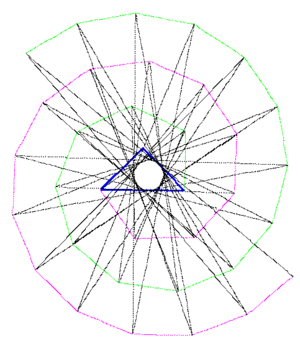User:David-Bryant

Hi. My name is David Bryant. I'm a retired actuary / assembly language (IBM 360 / 370) programmer living in Canyon Lake, Texas. I have been contributing to the KDE project for about three years, mostly doing documentation for the PIM subsystem (KMail, KAddressBook, etc.) I've been struggling to wrap my head around "object-oriented" programs for years. I joined the Qt wiki because I want to understand the c++ code in various KDE programs better than I do now.
Oops is hard!
The other day I encountered a problem while trying to run an example program presented in this article. I think the instructions are a bit unclear. Anyway, I managed to create a compiler error in Qt-Creator that I couldn't circumvent ... the linkage editor was looking for an external symbol "_start" that the c++ compiler had not generated (because I didn't have a "main()" function defined in the source code).
After digging around the internet a little bit, I ran across this snippet of code (compiled with gcc).
#include<stdio.h>
#include<stdlib.h>
void _start()
{
int x = my_fun(); //calling custom main function
exit(x);
}
int my_fun() // our custom main function
{
printf("Hello world!/n");
return 0;
}
If this code is compiled / linked with "gcc -nostartfiles -o example example.c". I get a warning message from the C compiler, but it does create an object program, which looks like this:
example: file format elf64-x86-64
Disassembly of section .plt:
0000000000001000 <puts@plt-0x10>:
1000: ff 35 02 30 00 00 push 0x3002(%rip) # 4008 <_GLOBAL_OFFSET_TABLE_+0x8>
1006: ff 25 04 30 00 00 jmp *0x3004(%rip) # 4010 <_GLOBAL_OFFSET_TABLE_+0x10>
100c: 0f 1f 40 00 nopl 0x0(%rax)
0000000000001010 <puts@plt>:
1010: ff 25 02 30 00 00 jmp *0x3002(%rip) # 4018 <puts@GLIBC_2.2.5>
1016: 68 00 00 00 00 push $0x0
101b: e9 e0 ff ff ff jmp 1000 <puts@plt-0x10>
0000000000001020 <exit@plt>:
1020: ff 25 fa 2f 00 00 jmp *0x2ffa(%rip) # 4020 <exit@GLIBC_2.2.5>
1026: 68 01 00 00 00 push $0x1
102b: e9 d0 ff ff ff jmp 1000 <puts@plt-0x10>
Disassembly of section .text:
0000000000001030 <_start>:
1030: 55 push %rbp
1031: 48 89 e5 mov %rsp,%rbp
1034: 48 83 ec 10 sub $0x10,%rsp
1038: b8 00 00 00 00 mov $0x0,%eax
103d: e8 0d 00 00 00 call 104f <my_fun>
1042: 89 45 fc mov %eax,-0x4(%rbp)
1045: 8b 45 fc mov -0x4(%rbp),%eax
1048: 89 c7 mov %eax,%edi
104a: e8 d1 ff ff ff call 1020 <exit@plt>
000000000000104f <my_fun>:
104f: 55 push %rbp
1050: 48 89 e5 mov %rsp,%rbp
1053: 48 8d 05 a6 0f 00 00 lea 0xfa6(%rip),%rax # 2000 <my_fun+0xfb1>
105a: 48 89 c7 mov %rax,%rdi
105d: e8 ae ff ff ff call 1010 <puts@plt>
1062: b8 00 00 00 00 mov $0x0,%eax
1067: 5d pop %rbp
1068: c3 retBelieve it or not, this actually makes more sense (to me) than the C source code. I can see parameter lists being created, registers being saved and restored, subroutines being called, etc. The only thing I don't see is the literal "Hello World!\n", which is presumably in the object module's data section. I had to dig a little deeper, but I found that, too.
Disassembly of section .rodata:
0000000000002000 <.rodata>:
2000: 48 rex.W
2001: 65 6c gs insb (%dx),%es:(%rdi)
2003: 6c insb (%dx),%es:(%rdi)
2004: 6f outsl %ds:(%rsi),(%dx)
2005: 20 77 6f and %dh,0x6f(%rdi)
2008: 72 6c jb 2076 <__GNU_EH_FRAME_HDR+0x66>
200a: 64 21 00 and %eax,%fs:(%rax)I think this is pretty funny. The "objdump" program is interpreting a bunch of ASCII data as machine instructions! It would make more sense if it displayed like a regular hexdump:
Disassembly of section .rodata:
0000000000002000 <.rodata>:
0002000 6548 6c6c 206f 6f77 6c72 2164 0000 0000 eH ll .o ow lr !d .. ..